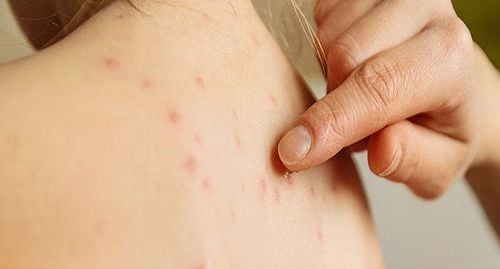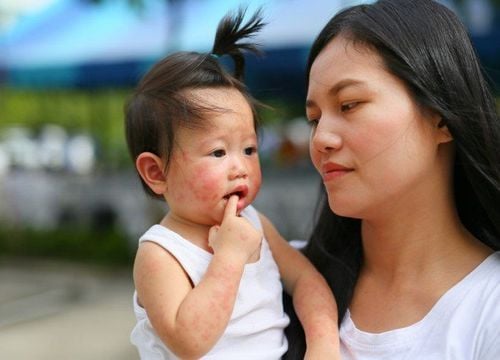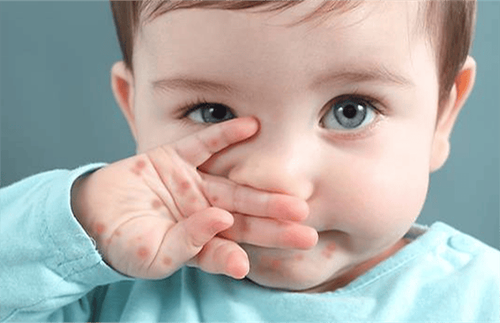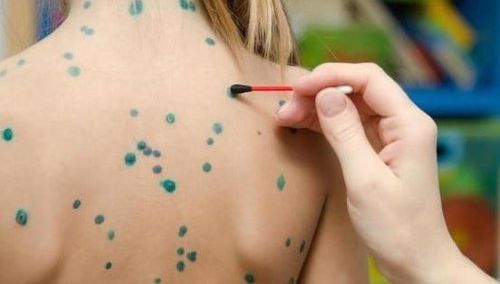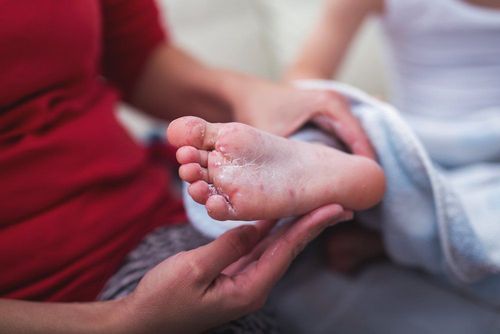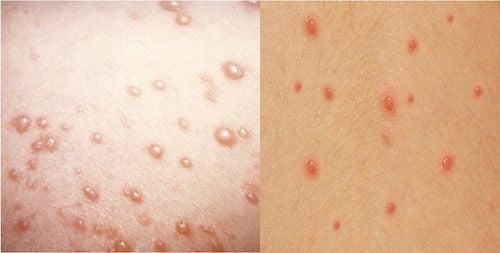Unusual crying, persistent high fever, and startling are three signs of severe hand, foot, and mouth disease in children. Parents need to pay attention and take their children to the doctor promptly to avoid serious complications.
1. Three signs of severe hand, foot, and mouth disease
• Children crying persistently
Children with hand, foot and mouth disease may cry a lot, even continuously all night without sleeping. They may sleep for about 15 - 20 minutes, wake up crying, then go back to sleep. Many parents think that this condition is due to the baby having sores in the mouth, causing pain. But in fact, it is due to early-stage neurotoxicity.
• The child has a high fever that does not go away
Symptoms of fever above 38.5oC, lasting continuously for more than 48 hours and not responding to paracetamol are signs of severe hand, foot, and mouth disease. At this time, the inflammatory response processes are taking place very strongly in the body, causing neurotoxicity. To overcome this condition, you need to use a fever reducer containing ibuprofen.
• Startled children
Startled children are a sign of neurotoxicity. Parents should pay attention to observe and detect this symptom, even when the child is playing, and pay attention to whether the number of times the child is startled increases over time.

2. How to care for children with hand, foot and mouth disease at home
• Oral hygiene for children
For hand, foot and mouth disease in children, blisters in the mouth are the most notable problem that makes children in pain and unable to eat, and also prevents oral hygiene, leading to the risk of secondary infection, periodontitis and oral thrush. You should not use milk towels or cotton gauze soaked in salt water to wash your child's teeth because it will easily cause the blisters to break and the risk of ulcers becoming more serious.
The best way to clean the child's mouth is to use saline for the child to rinse the mouth after each meal, before going to bed and after waking up. Encourage children to try to drink plenty of water and rinse their mouths with salt water. This can clean the mouth without causing any danger.
• Nutrition
Children with hand, foot and mouth disease are mostly anorexic and may not even eat anything because the ulcers in the oral mucosa cause a lot of pain. Therefore, when choosing food for children, priority should be given to soft, cool foods that create a pleasant feeling, such as nutritional powder, milk, yogurt, cheese, etc. If the child is still breastfeeding, it is necessary to continue breastfeeding, maintain good oral hygiene, rest and avoid stimulation.
• Skin hygiene
Skin hygiene is a necessary step to avoid bacterial superinfection in children. Accordingly, parents can bathe their children with mild antiseptic liquids, such as tea leaves, gotu kola leaves, etc. Use Betadin solution to apply and wash skin lesions after bathing.
If your child has a fever, you should give him or her paracetamol-containing antipyretics according to the instructions on the drug information sheet. Only use the medicine when your child has a fever of 38.5 degrees Celsius or higher, combined with wiping the armpits and groin to cool them down. However, if you notice that after taking the medicine, your child's condition does not improve but continues to persist, it is likely a sign of worsening hand, foot and mouth disease, and you should take your child to see a doctor as soon as possible.
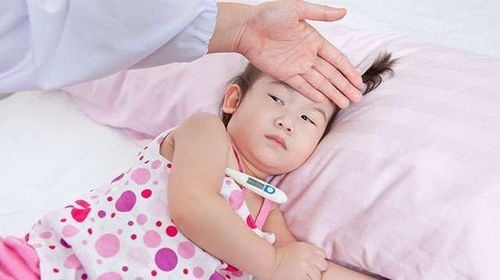
3. Preventing hand, foot and mouth disease in children
Parents can take the following measures to prevent hand, foot and mouth disease in children:
- Wash your hands thoroughly and regularly with soap, under clean running water (for both adults and children), especially before preparing food, before and after feeding your child, before holding or hugging your child, after going to the toilet, after cleaning your child and after changing diapers;
- Ensure good food hygiene: Eat cooked food, drink boiled water, wash utensils before and after use (preferably soak in boiling water), ensure clean water is used in daily activities, do not pre-masticate food for children, and do not allow children to hand-feed themselves, suck their fingers, or put toys in their mouths, limit children from sharing utensils with other children, including napkins, handkerchiefs, toys, eating utensils such as cups, bowls, plates, spoons, etc.;
- Regularly clean and wipe surfaces and tools that come into contact with your child every day, such as floors, table/chair surfaces, toys, school supplies, doorknobs, and stair handrails with soap or appropriate detergents;
- Do not let your child come into contact with patients with hand, foot, and mouth disease or suspected signs of the disease;
- Isolate sick children at home. Do not go to places with a large number of children such as nurseries, schools, and playgrounds during the first 10-14 days of the disease.
Parents need to monitor their child's symptoms. If they notice 1 of the 3 signs that hand, foot, and mouth disease is getting worse, they need to take their child to the doctor for timely treatment to avoid dangerous complications.
To arrange an appointment, please call HOTLINE or make your reservation directly HERE. You may also download the MyVinmec app to schedule appointments faster and manage your reservations more conveniently.




